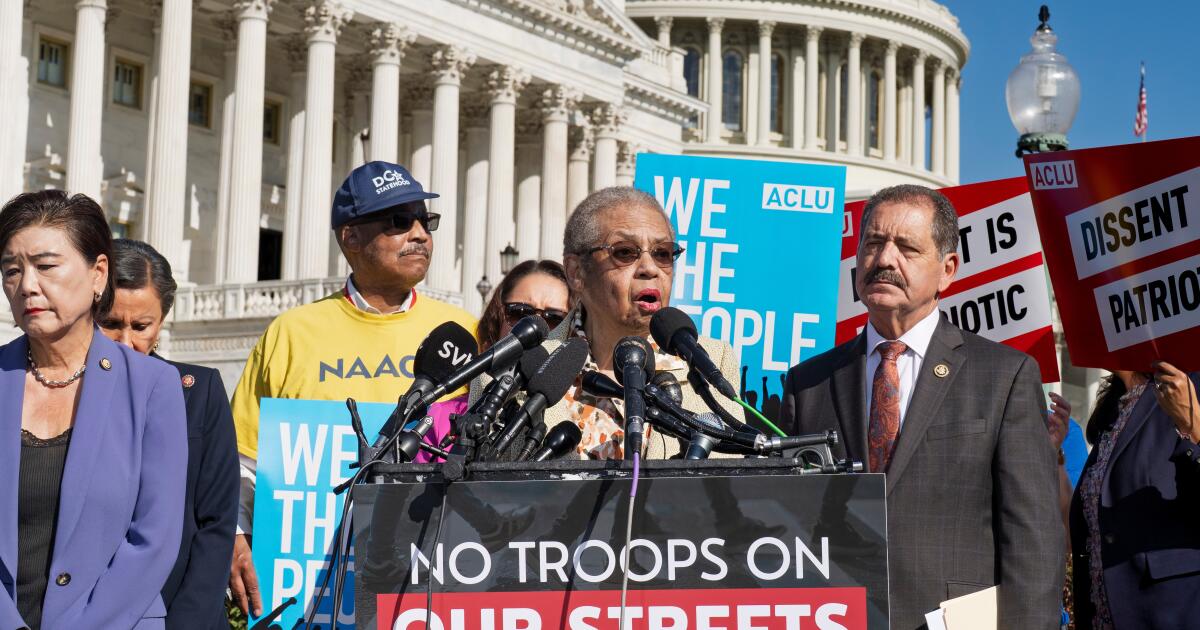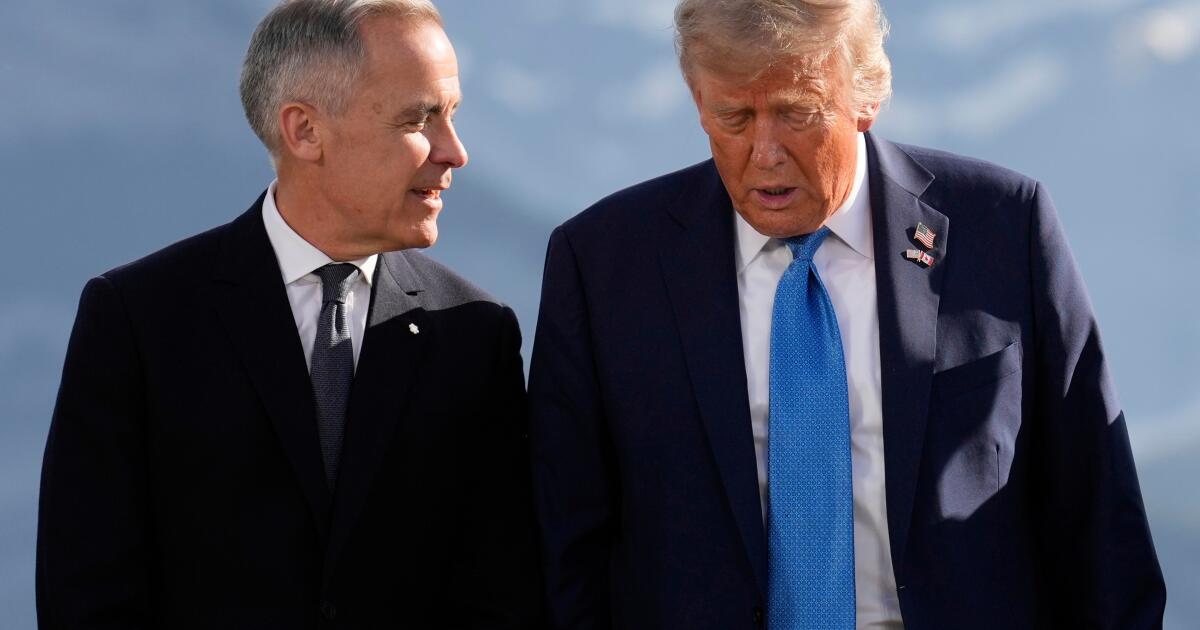Trump’s intervention in Washington prompts calls for its 18-term House delegate to step down
WASHINGTON — Troops patrol train stations and streets in the nation’s capital. Masked federal law enforcement agents detain District of Columbia residents. Congress passes bills that further squeeze the city’s autonomy. And the one person who could act as a voice for Washington on Capitol Hill has been a rare sight.
Even longtime allies say Democrat Eleanor Holmes Norton, the district’s nonvoting delegate in the House, has not risen to the challenge of pushing back against the Trump administration’s intervention into her city. They cite her age, 88, and her diminished demeanor.
That has raised questions about the 18-term lawmaker’s future in that office and has led to calls for her to step aside and make way for a new generation of leaders. The race to replace her has began in earnest, with two members of the D.C. Council, including a former Norton aide, announcing campaigns for the 2026 contest.
“D.C. is under attack as at no other time in recent history, and we need a new champion to defend us,” Donna Brazile, a onetime Norton chief of staff, wrote in a Washington Post opinion essay.
Brazile acknowledged Norton’s legendary service and why she might wish to continue. “As I’ve told her in person,” Brazile said, “retirement from Congress is the right next chapter for her — and for the District.”
Norton has so far resisted that call. Her office declined to make her available for an interview, and her campaign office did not respond to requests for comment. The oldest member of the House, Norton came to office in 1991 and has indicated she plans to run next year.
Federal intervention created new demands
Washington is granted autonomy through a limited home rule agreement passed by Congress in 1973 that allowed residents to elect a mayor and a city council. But federal political leaders retain ultimate control over local affairs, including the approval of the budget and laws passed by that council.
That freedom came under further restrictions after Republican President Trump issued an emergency order in August. It was meant to combat crime as he federalized the city’s police department and poured federal agents and National Guard troops into the city. Trump’s emergency order expired in September, but the troops and federal officers remain.
While the D.C. delegate position is a nonvoting one, it grants the people of the district, who have no other representation in Congress, a voice through speechmaking on the House floor and bill introduction.
Even without a vote in Congress, “there are so many things that the delegate can do from that position, even if it’s just using the bully pulpit,” said Cliff Albright, co-founder of Black Voters Matter, a voting rights group. “Even if it’s just giving folks encouragement or showing that fight that a lot of people want to see.”
At public appearances, Norton has seemed unsteady and struggled to read from prepared notes, including at a recent committee hearing focused on stripping some of Washington’s independence on prosecuting crime.
During Trump’s monthlong security emergency and since, Norton has not been as publicly visible as city officials, who attended protests and held media events denouncing the intervention.
Without a push for party unity from congressional leaders on Washington’s interests, the delegate’s role has added importance, said George Derek Musgrove, associate professor of history at the University of Maryland-Baltimore County.
“The delegate really has to be a one-person whip operation to try and hold the caucus in line against this Republican onslaught,” Musgrove said.
City leaders step in
It is unclear what a more energetic delegate could have done, given Trump’s expansive view of executive power and Republican control of Congress. Nonetheless, some critics of her performance have suggested it might have helped the city avoid a recent federal budget plan that created a $1.1-billion budget hole earlier this year. Months later, Congress has yet to approve a fix for the shortfall, even though Trump has endorsed one.
With Norton quiet, other leaders in the Democratic-run city have filled the void since Trump’s emergency declaration.
Mayor Muriel Bowser has stepped in as the district’s main mediator with the administration and Congress, joined by the council, although that outreach has been fragmented. D.C. Atty. Gen. Brian Schwalb sued the administration in the most combative stance against the federal government’s actions.
As Norton left a recent House hearing about the district, she responded with a strong “no” when asked by reporters whether she would retire.
Among those seeking to challenge her in next year’s Democratic primary are two council members — Robert White Jr., a former Norton aide, and Brooke Pinto. Many others in the city have expressed interest. Allies, including Bowser and House Democratic leader Hakeem Jeffries of New York, have declined to publicly endorse another Norton run.
A push for new faces
Norton’s life is a journey through American history.
In 1963, she split her time between Yale Law School and Mississippi, where she volunteered for the Student Nonviolent Coordinating Committee. One day during the Freedom Summer, civil rights activist Medgar Evers picked her up at the airport. He was assassinated that night. Norton also helped organize and attended the 1963 March on Washington.
Norton went on to become the first woman to lead the Equal Employment Opportunity Commission, which helps enforce anti-discrimination laws in the workplace. She ran for office when her predecessor retired to run for Washington mayor.
Tom Davis, a former Republican congressman from Virginia and a staunch Norton ally who worked with her on a number of bills, said voters should know who she is and what she is capable of, even now.
“She saved the city,” he said, listing off accomplishments such as the 1997 act that spared the city from bankruptcy, as well as improving college access. “She was a great partner.”
Davis said both major political parties are yearning for new faces.
“She’s still very well respected. She’s got a lot seniority,” he said. “I think she’s earned the right to go out on her terms. But that’s gonna be up to the voters.”
Fields, Brown and Khalil write for the Associated Press.

